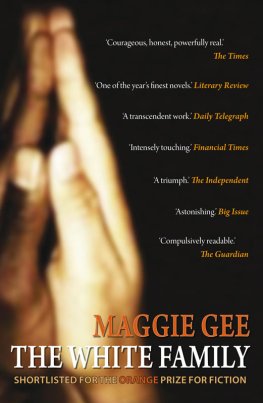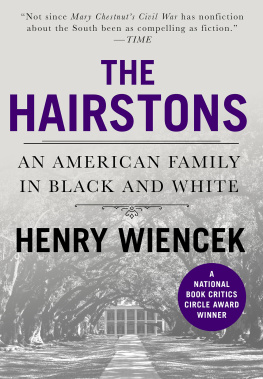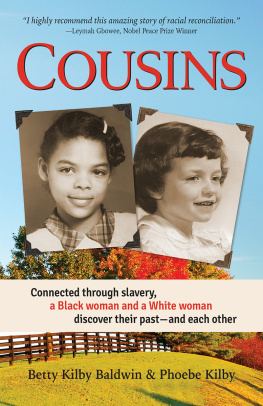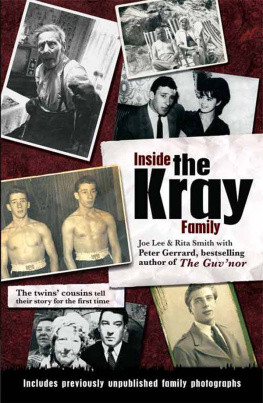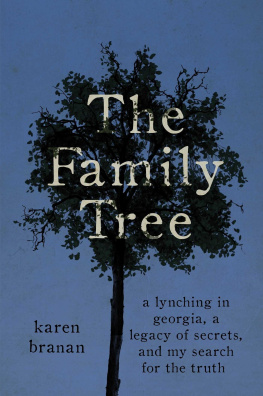ALSO BY ELLEN DOUGLAS
A Familys Affairs
Black Cloud, White Cloud
Where the Dreams Cross
Apostles of Light
The Rock Cried Out
A Lifetime Burning
The Magic Carpet
Cant Quit You, Baby
TRUTH : Four Stories I Am Finally Old Enough to Tell
by ELLEN DOUGLAS
Algonquin Books of Chapel Hill
Published by
ALGONQUIN BOOKS OF CHAPEL HILL
Post Office Box 2225
Chapel Hill, North Carolina 27515-2225
a division of
Workman Publishing
225 Varick Street
New York, New York 10014
1998 by Ellen Douglas. All rights reserved.
Library of Congress Cataloging-in-Publication Data is available for a previous edition of this work.
E-book ISBN 978-1-56512-899-6
In memory of Gold Smith Sr. and Gold Smith Jr.
Forgetting is just another kind of remembering.
Robert Penn Warren, Brother to Dragons
Acknowledgments
My thanks to the staff of the Mississippi Department of Archives and History for excerpts from the Lizzie McFarland Blakemore Collection and to the Mississippi Historical Society for excerpts from Life, Letters and Papers of William Dunbar, compiled by Eron Rowland. Thanks also to the Hill Library at Louisiana State University for excerpts from the Lemuel P. Conner and Family Papers and the William J. Minor and Family Papers, Louisiana and Lower Mississippi Valley Collections, LSU Libraries, Louisiana State University, Baton Rouge.
Thanks to Winthrop Jordan for reading and commenting on On Second Creek, not to mention writing the book Tumult and Silence at Second Creek, which set me on a quest; to friends and family who have patiently read and listened to and commented on these tales; to Kathie Blankenstein, Tom Gandy, and Alma Carpenter for generously sharing their difficult kinds of expertise; and particularly to Gold Smiths widow and his friends who spoke to me about his life.
Contents
G RANT
We are forever cleaning up our act.
Robert Stone, The Reason for Stories
T HIS IS A STORY that has been waiting for meand now I am old enough to tell it. Not that I had forgotten. How could I forget what happened in my house, under my nose, to me? I even thought from time to time about telling one of the stories that lay next to it, so to speak. There were the bees the night Grant died. There was Rosalie, who sat by him every day when he was dying, beautiful Rosalie, who had five children and sometimes came to work with a cut lip, a battered nose, a bruised temple. There were the day walks, the night walks. But I didnt want to tell those stories. Nothing came of thinking about them.
My husbands uncle came to live with us during the last year of his life. He was eighty-two. His wife had died several years earlier and he had no children. He had cancer.
He could have gone to a veterans hospitalhe was an Annapolis graduate, a retired naval officer. And there were other possibilities. Once he was too feeble to look after himself, he could have hired live-in help or gone into a nursing home. But we invited, insisted, and he came.
I knew him as one knows uncles-in-law who live in the same townas a genial enough fellow who brought his fiddle to family Thanksgiving gatherings and played badly to my husbands piano accompaniment. I can see him now on those occasions, fiddle tucked under his chin, standing over the piano, stooping to read the music, an expression of deep but clearly ironic concentration on his face, his head bent, light bouncing off the balding scalp. Theyd play easy pieces from a collection of violin and piano duets: None but the Lonely Heart, Humoresque, a Schubert serenade. After they finished a piece hed sit down, lay the violin across his lap, and smile. I always have trouble with the triplets in that one, he might say. And his mother, nearly ninety then and nodding in her wheelchair: Grant plays so well. Its a pity his violin squeaks.
That was a family joke.
So... Why did we invite him in? Well, again, familyhe was family. One couldnt send him off to a veterans hospital or put him in a home, could one? But Im misstating the case. No one could send him anywhere. He was perfectly capable of sending himself anywhere he wished, or of staying where he was, in the house his wife had left to her own niece and nephew.
Now theres another story. His wife, Kathleen, who was fifteen years younger than he, had died suddenly of a stroke. Shed doubtless always believed he would die first (hed been retired early from the navy after a coronary) and had consequently left him nothing. The house and what other modest property they had was in her name. His name was not even mentioned in her will.
Grant could have contested it, of course: in our state you cant leave all your property away from a spouse. But he would never have done such a dishonorable thing. In her will she had said what she wanted. It would be done.
In their dealings with him the niece and nephew were correct, but they were a cold pair to my way of thinking. Or maybe its just that they were like me, had other things to think about besides aged uncles-in-law. They gave him permission to live in the house for the rest of his life. So that there would be no confusion about the title, they paid the taxes and he reimbursed them. They didnt charge him any rent. He paid repairs and upkeep.
Now I ask you, no matter how much younger you were than your husband, no matter if hed had a coronary, would you leave everything away from him? Wouldnt you think he might by chance survive you? You might get run over by a truck or stung to death by hornets or drown or get trapped in a burning house, or God knows what. Surely you would mention in your will the name of your husband of forty years.
The only light he shed on this story came when he moved in with us and was clearing out of her house the things that belonged to him. He brought with him his clothes, a couple of canvas-covered wicker trunks from his tour in the Philippines before the First World War, a beautiful Japanese tea set, some brass trays from India, a huge piece of tapa cloth, his easy chair. Everything elsethe furniture, his wedding silver, china, linens, even the lovely carved cherry bed hed had made for them by a local cabinetmakerAll that stuff, he said, I got it for her. It was hers. She left everything to them. So...
He brought his navy dress uniform and his cocked hat, circa 1911. Theyre still in a closet somewhere in our house, the uniform in a mothproof bag, the hat stored in its leather case.
His sword he had given some years earlier to one of our sons. His violin he gave to my husband.
I think of one ray of light his wife shed on their marriage, although, I dont know, it may be misleading.
She was one of those large, soft-looking women, fair haired and blue eyed, who, statistical studies indicate, are most vulnerable in middle age to gall bladder attacks and diverticulitis. And indeed she did have the latter, although not for long, since she died when she was sixty.
In any case, what she said surprised me. Shed always seemed an easygoing, lively lady, ready for a good time, and I would have thought her tolerant of other peoples foibles and failures and moral lapses. Not so, or not everybodys. We were talking of a man in the county who had left his wife for a woman who was widely known to have had in the course of her life a number of open love affairsnot so common among the small-town gentry of a couple of generations ago. I mean, people had clandestine affairs, of course, but not open ones. Shes filth, Grants wife said to me when I commented once on this ladys charm and wit. Filth. Thats what they both are. She shivered and looked straight at me. (This was when I was quite a young woman, still focused almost to the exclusion of everything else on those lovely nights in bed.) Men, she said. Theres only one thing men want and she gives it to them.
Next page

